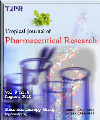
|
Tropical Journal of Pharmaceutical Research
Pharmacotherapy Group, Faculty of Pharmacy, University of Benin, Benin City, Nigeria
ISSN: 1596-5996
EISSN: 1596-5996
Vol. 15, No. 6, 2016, pp. 1151-1157
|
 Bioline Code: pr16154
Bioline Code: pr16154
Full paper language: English
Document type: Research Article
Document available free of charge
|
|
|
Tropical Journal of Pharmaceutical Research, Vol. 15, No. 6, 2016, pp. 1151-1157
| en |
Licochalcone A exerts antitumor activity in bladder cancer cell lines and mice models
Zhang, Yue-Yang; Huang, Chang-Ting; Liu, Shao-Ming; Wang, Bin; Guo, Jun; Bai, Jian-Qi; Fan, Xiao-Jing & Jia, Yu-Sen
Abstract
Purpose: To investigate the effect of licochalcone A (LA) on the inhibition of cell proliferation and ERK1/2 phosphorylation in bladder carcinoma cell lines.
Methods: Cell viability was investigated using 3-(4,5-dimethylthiazol-2-yl)-2,5-diphenyltetrazoliumbromide (MTT) assay. Dye-binding method was used to examine the concentration of proteins. Lymphocytes were extracted from mice and after surface staining were subjected to BD fixation and permeabilization for intracellular staining. Flow cytometry was used to measure cellular fluorescence.
Results: MTT results revealed a significant decrease in the proliferation of UM-UC-3, J82 and HT-1197 cell lines on treatment with LA. LA also induced reduction in phosphorylation of ERK1/2 in all three carcinoma cell lines. In the mouse model, licochalcone A treatment via intraperitoneal (ip) administration induced a significant decrease in the level of regulatory T cells (Tregs). Comparison of the mouse interferon-α (IFN-α)-treated and LA-treated groups revealed that LA treatment caused enhancement of cytotoxic T lymphocyte (CTL) activity similar to that of IFN-α. Administration of UM-UC-3 cells in C3H/HeN mice resulted in marked reduction in the counts for splenocytes and CD4+ CD25+ Foxp3+ T (regulatory T cells) cell proportion in LA-treated mice compared to untreated control group.
Conclusion: Licochalcone A may be of therapeutic importance for the prevention of bladder carcinoma. However, studies are required to ascertain the compound’s usefulness in this regard.
Keywords
Licochalcone A; Bladder carcinoma; Splenocytes; Phosphorylation; Cell proliferation; Interferon
|
| |
© Copyright 2016 - Tropical Journal of Pharmaceutical Research
Alternative site location: http://www.tjpr.org
|
|
